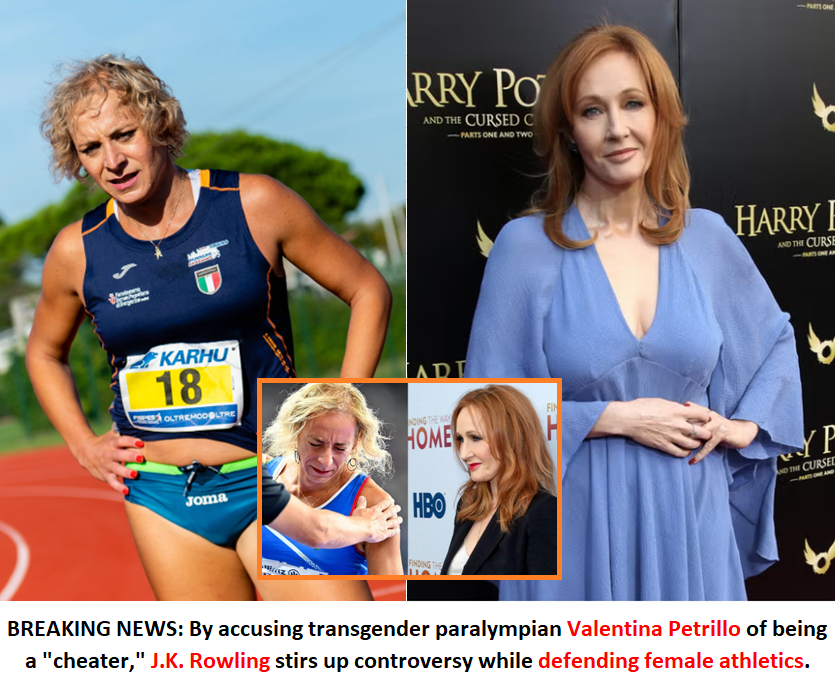J.K. Rowling, the famed author of the Harry Potter series, has once again found herself at the center of a storm of controversy after accusing transgender Paralympian Valentina Petrillo of being a “cheater.” The comments, made during a recent interview, have sparked outrage within the LGBTQ+ community and among supporters of transgender rights, while also reigniting the ongoing debate surrounding the inclusion of transgender athletes in women’s sports.

Rowling, who has faced significant backlash in the past for her comments on transgender issues, has long been an outspoken critic of policies that allow transgender women to compete in female sports. In her most recent remarks, she raised concerns about what she perceives as the “unfair advantage” that transgender women might have over cisgender women in competitive athletics.
Petrillo, an Italian Paralympian who made history as the first openly transgender woman to compete in professional female athletics, has been the subject of intense scrutiny. The 47-year-old athlete, who is a world-class sprinter and has won multiple medals in her field, transitioned later in life and became one of the most prominent figures in the conversation about transgender inclusion in sports.
During the interview, Rowling criticized Petrillo’s participation in women’s events, calling her a “cheater” and claiming that the athlete’s physical advantages, having been assigned male at birth, undermine the integrity of women’s sports. “It’s clear to me that, when a transgender woman who was born male competes against women, it’s not a level playing field,” Rowling said. “It’s cheating, and it’s disrespectful to the female athletes who have worked their entire lives to compete.”
Rowling’s comments have sparked immediate backlash from many, particularly those who advocate for transgender rights and inclusion in sports. Many critics argue that her view misrepresents the challenges that transgender athletes face and overlooks the complexities of hormone replacement therapy (HRT), which is required for transgender athletes to compete in women’s events according to many sporting regulations.
Transgender advocates have quickly come to Petrillo’s defense, condemning Rowling’s characterization of her as a “cheater.” “Valentina Petrillo is an incredible athlete who has worked tirelessly to achieve success in her sport,” said one LGBTQ+ advocacy group. “Her accomplishments are not only a testament to her hard work but also a reminder that athletes, regardless of gender identity, deserve to be respected and celebrated for their talents.”
Rowling’s stance, however, has found support among some who argue that the inclusion of transgender athletes in women’s sports is unfair and dilutes the opportunities for cisgender women. These individuals claim that transgender women may still retain physical advantages from their male puberty, which, despite hormone treatments, can persist in certain cases.
The controversy surrounding Rowling’s comments raises broader questions about the intersection of gender identity and competitive sports. While transgender athletes face unique challenges in both their personal and professional lives, their inclusion in sports has become a contentious issue, with varying policies across different athletic organizations. The International Olympic Committee, for example, has established guidelines that allow transgender women to compete in women’s events if their testosterone levels are below a certain threshold, but the implementation of these policies is still debated.
In response to the backlash, Rowling has doubled down on her views, stating in a follow-up statement, “I stand by my belief that women’s sports should be protected and fair for all female athletes, and I will continue to speak out on this issue, even if it means facing criticism. The truth matters.”
Meanwhile, Petrillo, who has yet to comment directly on Rowling’s accusations, remains focused on her career and the upcoming events in her athletic calendar. Her supporters continue to praise her for her achievements and for being a trailblazer in the world of Paralympic athletics, while also advocating for a more inclusive and understanding approach to the participation of transgender athletes.
As the debate continues, it is clear that the issue of transgender athletes in women’s sports is far from resolved. While some believe in the importance of fair competition, others emphasize the need for inclusivity and respect for transgender individuals who seek to participate in athletics at the highest levels. The controversy surrounding J.K. Rowling’s comments is only the latest chapter in an ongoing discourse that is likely to evolve as more transgender athletes make their mark in the world of professional sports.
The situation has brought to light the complexities of balancing fairness, inclusion, and respect for all athletes, regardless of their gender identity. As the conversation continues, it is crucial that dialogue remains respectful and focused on finding solutions that allow athletes like Valentina Petrillo to pursue their dreams without unnecessary barriers.
Leave a Reply